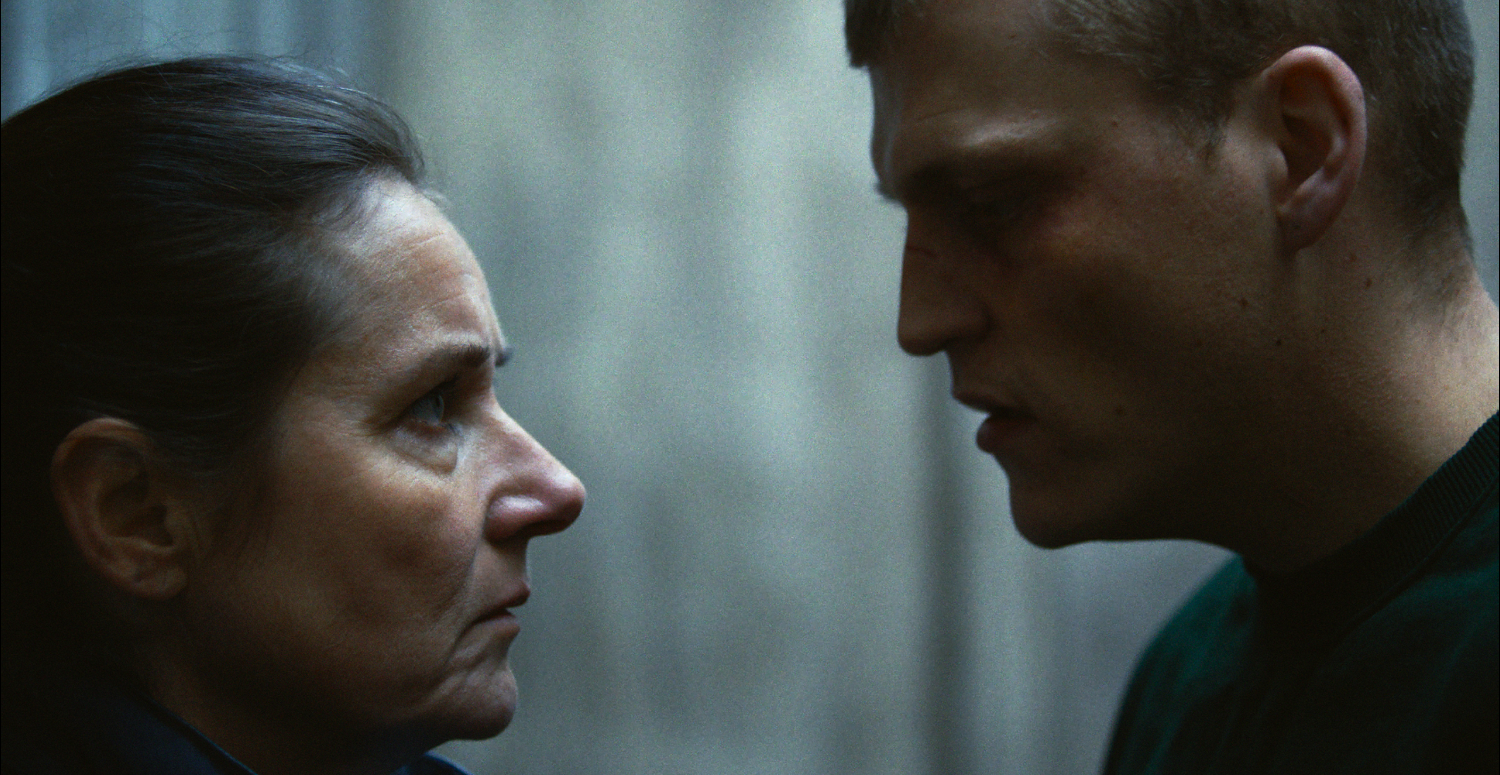Sons
Vogter
2024

FR EN
Second film de Gustav Möller après le stupéfiant et très acclamé « The Guilty » (qui a depuis eu droit à un remake américain avec Jake Gyllenhaal), « Sons » est à nouveau un thriller étouffant quasi-à-huis-clos sur un membre des forces de l’ordre à la morale floue. Très doué pour faire monter la tension, le réalisateur dano-suédois signe un polar carcéral froid, noir et anxiogène qui interroge l’(im)possibilité du deuil et du pardon. C’est un double portrait de deux âmes esseulées en quête de rédemption : l’une est gardienne de prison dans une unité tranquille où elle y a développé une relation presque maternelle avec ses détenus, l’autre est un condamné pour meurtre envoyé en unité de haute sécurité. Quand Eva voit Mikkel arriver parmi les nouveaux prisonniers, elle le reconnaît et demande au mépris du conflit d’intérêt sa mutation dans son unité. Quels sont donc leurs liens ? Pourquoi cherche-t-elle à le voir ? Et lequel des deux manipule-t-il vraiment l’autre ?
Ce transfert s’apparente au voyage psychologique d’Eva dont on suit le point de vue tout du long, de l’image de la bonté à celle du monstre, elle se transforme pour finir sur une scène de confrontation tel un tableau où le trio attablé semble prisonnier de ses souffrances. Aux côtés de Sebastian Bull (à la fois très masculin tout en gardant un air d’enfant) et de Dar Salim (en chef d’unité), le film est porté par l’excellente performance de Sidse Babett Knudsen (Borgen ; La Fille de Brest) pour qui le scénario a été écrit et pour une fois dans un rôle très sombre de personnage torturé. Avec une économie de geste et d’expression et un visage insondable, elle transmet la souffrance, le vide et les contradictions de ce personnage hanté et désespéré.
La réalisation particulièrement bien pensée de ce film mêlant étude de personnage et thriller enrichit grandement le récit avec une atmosphère oppressante et enfermée entre les murs de cette prison qu’on ne quitte quasiment jamais (à l’image du protagoniste qui se donne corps et âme à son travail, ce qui prendra progressivement tout son sens). Gustav Möller et son chef opérateur Jasper Spanning ont ainsi choisi un cadre serré en 4/3 nous enfermant dans ce lieu et avec ses personnages, soit via des gros plans qui prennent tout le cadre, soit par la claustrophobie des scènes de corridors, ou encore avec les ouvertures verticales des pièces (le tout renforcé par un très bon montage son). Ces choix de mise en scène confèrent au film un sentiment à la fois d’intimité semi-secrète tout en restant confiné dans un espace stérile et écrasant.
Bien que le dernier acte n’exploite pas à mon sens tout son développement potentiel, « Sons » reste un film très fort, captivant, très bien joué et magnifiquement mis en scène. Une nouvelle grande réussite pour ce réalisateur scandinave qui s’attaquera prochainement à son premier film américain …
Gustav Möller’s second feature after the stunning and highly acclaimed “The Guilty” (which has since earned an American remake starring Jake Gyllenhaal), “Sons” is once again a stifling, almost behind-closed-doors single-location thriller about a member of the law-enforcement community with ambiguous morals. The Danish-Swedish director’s talent for building tension makes for a cold, dark, anxiety-inducing prison thriller that questions the (im)possibility of mourning and forgiveness. It’s a double portrait of two lonely souls in search of redemption: one is a prison guard in a quiet unit where she has developed an almost maternal relationship with her inmates, the other is a convicted murderer sent to a high-security cell. When Eva sees Mikkel among the new prisoners, she recognizes him and, despite the conflict of interest, requests her transfer to his unit. But what’s their connection? Why does she want to see him? And which of them is really controlling the other?
This transfer is akin to Eva’s psychological journey, as we follow her point of view throughout, from goodness to monster, as she transforms herself and ends up in a tableau-like confrontation scene in which the trio at the table seem trapped by their own suffering. Alongside Sebastian Bull (at once very masculine yet childlike) and Dar Salim (as the unit leader), the film is driven by the excellent performance of Sidse Babett Knudsen (Borgen; Westworld), for whom the screenplay was specifically written, and for once in a very dark role as a tormented character. With few gestures and expressions, and an unfathomable face, she conveys the suffering, emptiness and contradictions of this haunted, desperate character.
The particularly well-thought-out direction of this film, which blends character study and thriller, greatly enriches the narrative, with an oppressive, locked-in environment within the walls of this prison that we almost never leave (like the protagonist, who gives her heart and soul to her work, which will gradually take on its full significance). Gustav Möller and his cinematographer Jasper Spanning chose a tight 4:3 frame, enclosing us in this place and with its characters, either through close-ups that take up the whole frame, or through the claustrophobia of the corridor scenes, or with the vertical openings of the rooms (all enhanced by great sound design). These directorial choices give the film a feeling of semi-secret intimacy, while remaining trapped in a sterile, overwhelming space.
Although the final act does not, in my opinion, fully explore its potential, “Sons” remains a very strong, captivating film, very well acted and brilliantly staged. Another great success for this Scandinavian director, who will shortly be moving on to his first American film …

